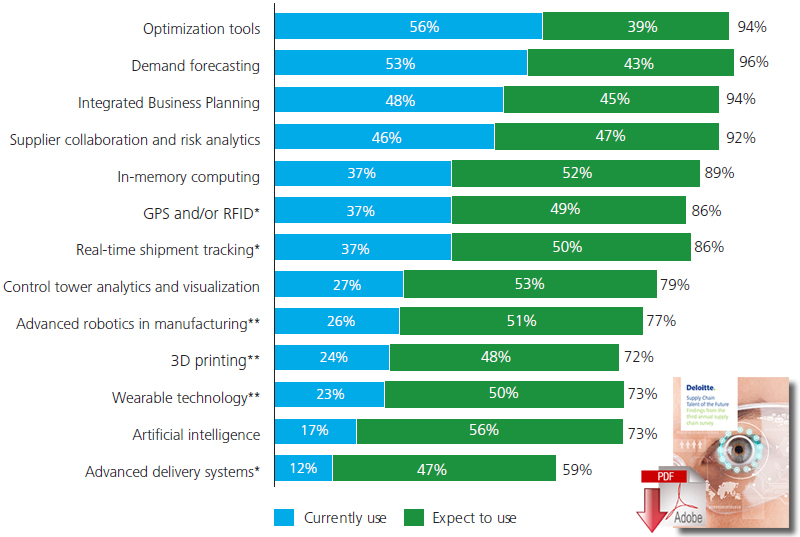Talent Drought Threatening Today’s Supply Chains
The heart of a global business has always been the operations by which it buys, makes and moves what it sells to customers.
Yet only 45 percent of supply chain and 40 percent of procurement executives at U.S.-based global companies say they are extremely or very confident that their supply chain organizations have the competencies they need today, according to the newly released “2015 Supply Chain Talent of the Future Survey” from Deloitte.
The survey also found wide disparities between these supply chain executives and top company leadership when it comes to assessing their supply chain’s talent.
In sharp contrast with the supply chain and procurement executives, more than three-fourths (77 percent) of CEOs and presidents say they are extremely or very confident their supply chain organizations have the required competencies needed for today.
More than half (54 percent) of the CEOs and presidents also say their supply chain organizations receive excellent or very good support from their human resources department, compared to only about a quarter (24 percent) for all other executives.
Use of Supply Chain Capabilities
In our survey we asked about 13 fast-evolving technical capabilities, ranging from real-time shipment tracking to artificial intelligence. Two of them - optimization tools and demand forecasting - are in most widespread use today. Regarding all but one, more than 70 percent of executives said either that their companies currently use them or that they expect to in the future. That represents quite a to-do list in terms of new capabilities.
“Today’s global economy demands a networked and efficient supply chain,” said Kelly Marchese, principal, Deloitte Consulting LLP, and supply chain strategy leader. “The disparities in viewpoints that exist between company leaders and supply chain professionals could materialize into actual barriers to success, particularly as companies try to evolve their supply chains through new technologies and operating model changes.
Approaches to talent management must evolve with supply chains to ensure today’s workers can meet tomorrow’s challenges. That can only occur if executives at every level are informed and in agreement when it comes to their talent needs.”

Skills Development Crucial
On average, less than half (45 percent) of all executives rate their employees as excellent or very good on seven leadership and professional competencies, such as strategic thinking and problem solving, the ability to manage global or virtual teams, and the ability to effectively persuade and communicate. At the same time, an average of about two-thirds (65 percent) of executives say these competencies will become more important to their supply chain during the next five years, creating a talent gap that could have serious implications for companies and their customers.
“Companies increasingly must extend their supply chain’s talent base beyond technical skills to bring more leadership and professional skills into more levels,” Marchese said. “This has the potential to empower and inspire employees at all levels to support constant innovation in fast-moving industries, and to generate new forms of leadership that can help create more engaged and effective supply chains.”
Retention over Recruitment
The survey also found recruiting new talent is seen as a greater challenge than retaining existing talent, especially at higher levels, suggesting that building skills internally is becoming increasingly important.
About two-thirds of executives say recruiting senior leadership for the director and senior director level is difficult, while less than half say retention is difficult.
The Emergence of ‘Value Webs’
The “2015 Supply Chain Talent of the Future Survey” comes on the heels of the recently released Business Trends Report, “Business Ecosystems Come of Age,” from Deloitte.
The report is a collection of nine articles that explore the ways businesses can thrive in the new world of ecosystems. In an article titled “From Supply Chains to Value Webs,” Marchese discusses the greater complexity facing supply chain managers and the new challenges they face as linear supply chains evolve into “value webs,” or ecosystems of suppliers.
“Having already mastered a profound shift from ownership to control of many assets, supply chain leaders will need new capabilities to also secure influence over and access to externally located resources, underpinned by increasingly organic, web-like, arrangements,” Marchese said.




